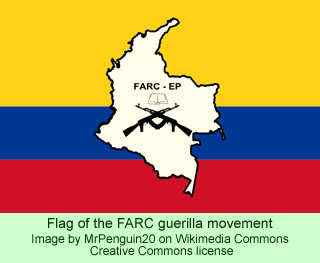Piaroa women, and their colleagues in surrounding communities, are becoming increasingly concerned about the violence that illegal miners and armed rebel gangs bring into their territories. The Organización de Mujeres Indígenas de Autana(OMIDA), a group based in the Amazonas State of Venezuela and composed primarily of Piaroa women, though with the support of females from neighboring indigenous groups, published on its website on December 14th a statement condemning violence.
The declaration by the women, prepared at the Second Assembly of the organization held in October, denounces the Revolutionary Armed Forces of Colombia (FARC), which is operating in their territory. Quoting from the Google translation of their document, the women say, eloquently, that the armed gangs “hound and harass and threaten the wise elders, leaders and active members of indigenous organizations. These forms of violence undermine our right to a life free of violence and are acts that aim to silence our voices.”
The next paragraph is equally hard hitting. The Piaroa women denounce illegal miners, who are also operating in their territory. The miners are “using coercion, threats and intimidation as a tactic to generate fear and contribute to the displacement of indigenous communities.” The women urge indigenous females of all ages in the region to be alert to the possibilities of being captured and abused by the armed groups and the miners.
They warn specifically about the dangers of enforced prostitution, sexually transmitted diseases, unintended pregnancies, and the other results of sexual violence to women and adolescent females. They express special concern for those living in areas near the illegal mining operations. They urge the Venezuelan government to investigate the situation.
The women not only decry the violence that these outsiders bring to their communities, they argue that their presence in Piaroa sacred places has an impact on their spiritual welfare.
To help control the situation, the women urge the government to reactivate the process of granting land titles to the Piaroa in their traditional territory. This will allow them to promote mechanisms for defending their sovereignty within the existing state structure. They ask the government to investigate the violence against indigenous women, teens, and girls. Finally, they propose that the government establish a committee composed of representatives of various agencies and organizations which should be charged with preparing an action plan to deal with the situation.
The statement garnered recognition in the press and among other organizations. The Venezuelan publication Gente de Hoy interviewed Betsy Arana, from OMIDA. She said that the organization arose out of concerns for indigenous women and their issues that are related to the struggles of the people.
She said that the organization, at its October assembly, discussed issues concerning indigenous lands, education, and health. But they agreed that contending with the illegal miners and the invading armed forces was their paramount issue. Their concerns prompted them to draft the resolution that Gente de Hoy reprints in its news story.
Survival International, the London-based tribal rights organization, issued its own statement on December 18th. The SI release cites not only the Piaroa but also other indigenous peoples in the forests of southern Venezuela who are highly concerned about the illegal mining and the FARC guerillas, and the havoc that those invaders are causing.
SI indicates that the Piaroa and the other peoples living fairly near the border with Colombia have been agitating about the situation for a while. A news report in 2013 reported on this story. SI writes that the activities of the armed gangs have now spread well beyond the border areas with Colombia into the indigenous territories of the Eñepa and Hoti peoples. So far, despite the continuing protests, government agencies have done nothing.
SI urges President Maduro to recognize the territories of the indigenous peoples, as the Venezuelan constitution provides, and to the take action to protect the tribal lands of the Piaroa and the others.
